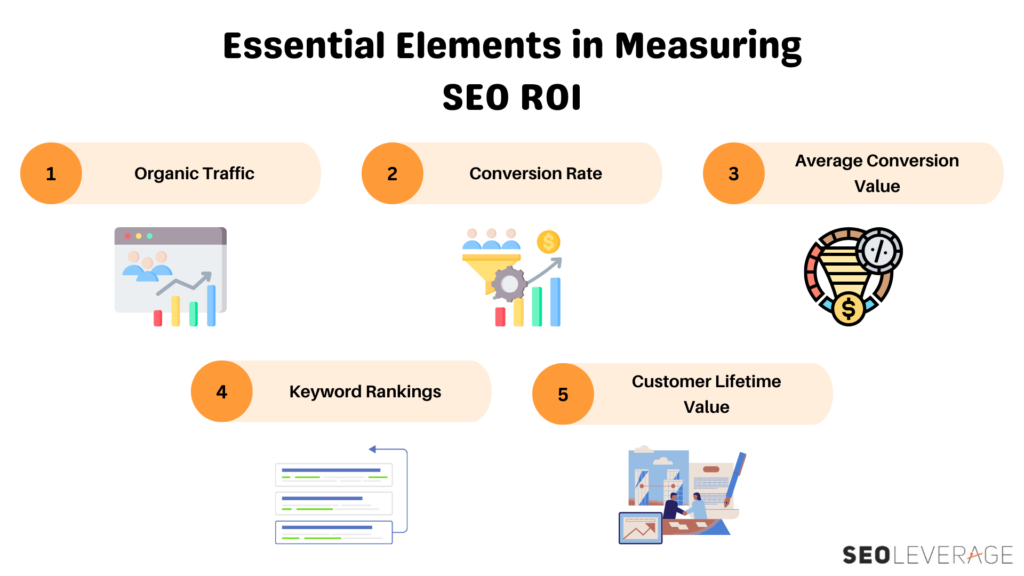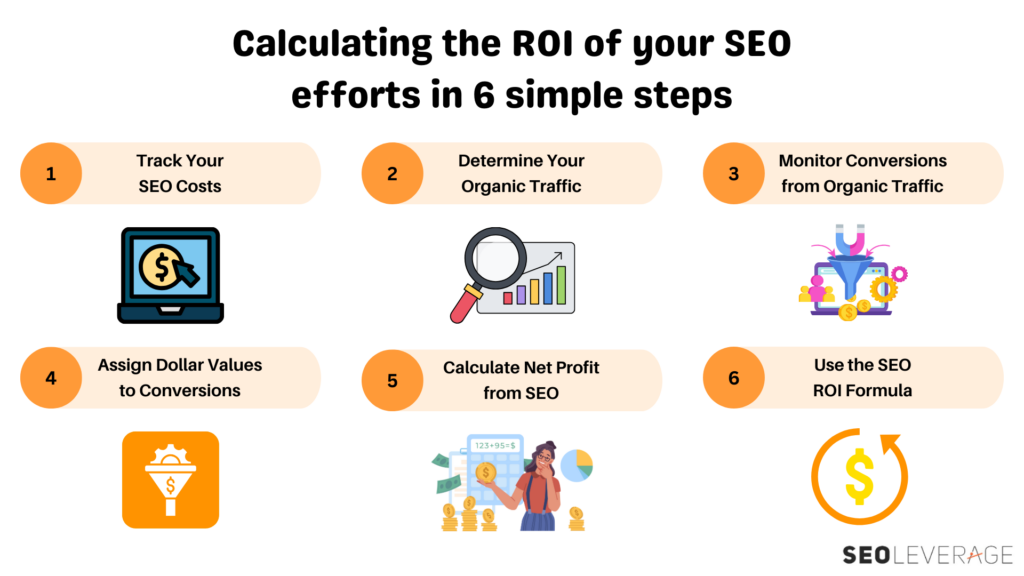In digital marketing, it is essential to grasp the impact and profitability of your search engine optimization (SEO) strategies. Every dollar and hour invested in SEO strategies, from keyword rankings to organic search improvements, should contribute to your overall business goals.
This detailed guide will help you understand the complex process of evaluating and determining the ROI of SEO campaigns, clarifying how businesses can precisely gauge the effectiveness of their SEO endeavors.
Key Takeaways:
- SEO ROI is a metric that evaluates whether your SEO investments generate profit or incur losses, encompassing various aspects of SEO beyond mere traffic and rankings.
- To ensure ongoing support and resources for SEO initiatives, it's vital to showcase a positive ROI, as this evidence plays a crucial role in convincing stakeholders and management to invest in SEO.
- Measuring SEO ROI involves monitoring essential metrics such as organic traffic, conversion rates, average conversion values, keyword rankings, and customer lifetime value, providing a comprehensive view of SEO effectiveness.
- Calculating SEO ROI consists of six distinct steps: tracking all SEO-related costs, assessing the volume of organic traffic, keeping tabs on conversions, assigning monetary values to these conversions, calculating the net profit, and applying the SEO ROI formula for a comprehensive assessment.
- Recognize that SEO is a long-term strategy with value extending beyond immediate returns. Regularly analyzing ROI allows for adjustments to the SEO strategy, focusing on effective practices, and preparing for shifts in the ever-evolving digital age.
Table of Contents
Understanding SEO ROI
SEO ROI measures the profit or loss you gain from your SEO activities concerning the amount of money you spend on them. It is a metric that goes beyond just tracking rankings and traffic -- it's about understanding the value these elements bring to your business.
Why It Matters for Your Business

- Justifying SEO Investment: Many people often view SEO as a long-term investment in digital marketing. Convincing stakeholders or management to invest in SEO tasks requires evidence of its effectiveness. Demonstrating a positive ROI from SEO activities can help secure the necessary budget and resources.
- Strategic Decision Making: By understanding which SEO strategies yield the best returns, you can make more informed decisions about where to focus your efforts and resources. This strategic approach ensures that you are not just driving traffic but driving the right kind that aligns with your business goals.
- Evaluating SEO Performance: Measuring ROI makes it easier to gauge your SEO campaign's success. ROI calculations enable you to assess the performance of different SEO tactics, from on-page optimizations to link-building efforts.
To understand its importance, let’s look at the following facts: 49% of marketers say organic search provides the best ROI among all marketing channels. From this we can deduce how important measuring ROI is for SEO.
Essential Elements in Measuring SEO ROI
Proper measurement is crucial for evaluating the success and return on investment of marketing initiatives like SEO. The following are essential metrics you should monitor on an ongoing basis to understand engagement, ROI, and optimization opportunities for improving organic search performance.
- Organic Traffic

Organic traffic refers to visitors who find your website through search engines like Google without paying for placement. Tracking changes in organic traffic over time shows how effective your SEO strategies and optimizations drive more qualified prospects to your site.
It is essential to analyze data on the traffic sources to determine which keywords and pages are performing best. Traffic analysis reveals opportunities for further optimization to continue increasing organic traffic.
- Conversion Rate

Conversion rate is the percentage of website visitors who complete a desired goal, such as purchasing, signing up for an email list, submitting a request form, etc. Rates can differ depending on the specific page or device, and looking at these differences can expose problems that may hinder conversions.
Tracking conversion funnels across the user experience surfaces any points where traffic may drop off and highlights areas of the site or content that could use improvement to boost ROI. Segmenting conversion rates by traffic source and keyword highlights what specific content attracts more qualified and engaged audiences.
- Average Conversion Value
Average order or conversion value refers to the average dollar amount represented by each transaction or conversion event. Monitoring this metric over time exposes any factors that could impact the average purchase total, such as abandoned cart recovery rates for ecommerce sites.
Looking at segmentation between different search terms or devices used can provide insights into what variables influence the purchase size or conversion value. Generally, optimization efforts should seek to increase this metric since higher values indicate acquiring and retaining more profitable long-term customers.
- Keyword Rankings

Keyword rankings refer to a website's position in organic search engine results pages for targeted business-related keyword phrases. Top rankings, especially for commercial and navigational intent keywords that many buyers may use, directly influence the amount of qualified traffic a site receives.
Tracking rank progression or declines across priority keywords reveals which content, technical, or link-building efforts succeed or fail to impact traffic potential. Segmented rank tracking further informs optimization by exposing losses and gains related to specific keywords.
- Customer Lifetime Value
Customer lifetime value is a calculation of the total net profit you can anticipate from the average customer throughout their lifetime doing business with your company. It is important to estimate this figure as higher CLV customers are worth more.
Regularly monitoring changes in customer purchasing and engagement patterns helps to refine the calculation of average lifetime revenues and costs segmented by relevant customer characteristics over time. Comparing CLV to customer acquisition cost will guide your decisions about optimizing acquisition funnels and loyalty programs.
Other important metrics include:
- Return on ad spend for determining paid channel profitability versus organic quality scores.
- Key performance indicators such as time on site, bounce rate, referring links, and goal completions for evaluating general performance.
- User behavior.
- Identifying operational issues.
Regular tracking and segmenting of all critical metrics reveal strategic opportunities for optimizing SEO and the customer journey.

How Can I Measure the ROI of My SEO Efforts?
Calculating the ROI of your SEO efforts involves 6 simple steps:
- Track Your SEO Costs: This includes the cost of hiring an SEO agency or consultant, any SEO tools or software used, content creation costs, and the time spent by your team on SEO tasks.
- Determine Your Organic Traffic: Utilize tools like Google Analytics to track the volume of visitors coming to your site through organic search. Segmenting this traffic is crucial to understanding which part directly relates to your SEO efforts.
- Monitor Conversions from Organic Traffic: Set up proper conversion tracking in Google Analytics or your preferred analytics tool. Identify how many visitors are converting into customers or leads. Depending on your business model, conversations can range from online purchases to contact form submissions. Monitoring will help you understand how many conversions result from your SEO work.
- Assign Dollar Values to Conversions: Depending on your business model, assign a monetary value to each conversion. For ecommerce transactions, this is the value of the sale. You might use an estimated value based on conversion rates and average customer value for lead generation.
- Calculate Net Profit from SEO: Subtract the total SEO costs from the revenue generated through SEO-driven conversions.
- Use the SEO ROI Formula: The basic formula for SEO ROI is (SEO Profit - SEO Cost) / SEO Cost.

Calculating SEO ROI
Your monthly SEO costs are $5,000, including agency fees, tools, and team time. That month, your website's organic traffic leads to sales totaling $25,000. The SEO ROI would be:
($25,000 - $5,000) / $5,000 * 100 = 400%
You're earning four dollars in return for every dollar spent on SEO. This equates to a 400% return on your initial investment of $5,000.
Real-World Applications and Strategies
- Forecasting and Planning: Use historical data and current trends in forecasting SEO ROI, aiding in strategic business planning and budgeting.
- Beyond E-Commerce: For businesses not directly selling online, SEO ROI can involve assessing lead quality, customer engagement, and brand reach.
- Holistic View of Marketing: Consider SEO part of your broader marketing ecosystem. Understand how it interacts with other channels and contributes to the customer journey.
- Evolving Your Strategy: Use ROI insights to adapt and develop your SEO strategy. Focus on what works, and prepare to shift resources as the digital ecosystem changes.
- The Long View: Remember that SEO is a long-term strategy. Immediate ROI, as is the ongoing value brought by increased brand visibility and authority, is vital.
Measuring your SEO ROI is crucial for making informed decisions in your digital marketing strategy. It helps ensure your efforts are well-aligned with your business objectives, driving growth by targeting the correct audience with precision. By focusing on the financial outcomes of your SEO activities, you can enhance the effectiveness of your investment and contribute to sustainable business expansion.
Elevate Your SEO with SEOLeverage
Ready to optimize your digital marketing efforts for maximum impact? SEOLeverage is here to assist. Our team of experienced SEO experts specializes in boosting organic visibility and online conversions through strategic, data-driven approaches. Contact us today to learn how we can support your brand's growth and success.

